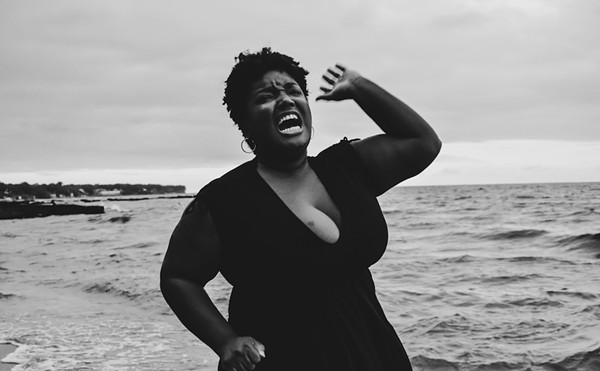The Great White Hope, which opened on Broadway in 1968, is a stylistically dated fictionalized epic about Jack Johnson. Called Jack Jefferson in the play, Johnson was the first black man to win a heavyweight boxing championship and to enrage Caucasian sensibilities by openly wooing white women.
Writing about the much-improved 1970 film version of Howard Sackler's Pulitzer Prize-winning play, New Yorker film critic Pauline Kael labeled it a parable about "how a black prize fighter is brought down by the white man's fear of the strength of blacks."
With conservatives yapping at our president's heels, touting Sarah Palin and Scott Brown as champions to restore the balance of power, the play's themes have never been timelier. So it is inevitable that Sackler's diatribe would once again put on its dentures and attempt to take a bite out of guilt-ridden white derierres.
Since the three-hour saga is of a scale that local theaters can no longer afford, it has taken the resources of three — Karamu House, Ensemble Theatre and Weathervane Playhouse — to reanimate this antique monster.
Stuffed on Karamu's proscenium stage, director Terrence Spivey's production brings to mind a ramshackle circus. With 45 thespians, the staging takes us back to that image of endless clowns emerging from a Volkswagen. As the play lumbers through what seems to be an eternity, it evokes a wheezing pachyderm.
Sackler has too much of the kind of ambition that flourished in the '60s to settle for one theatrical style. There are Our Town narrations, Ragtime interludes, daring attempts at blackface commentary and an entire scene in French a la Henry V. It makes for an overloaded evening that so anesthetizes the audience that it wouldn't matter if Jefferson lost the championship and lady love — or got eaten by a dinosaur.
Though lacking the budget or artistic resources to do justice to the work's Wagnerian ambitions, the production has many unexpected little pleasures to help us make it through the night. The giddiest is the sight of Cuyahoga County Commissioner Peter Lawson Jones in gingham and a bonnet enacting Topsy in a lunatic staging of Uncle Tom's Cabin. When not so dressed, he displays an amiable intensity — as the trainer — that portends a theatrical career even beyond politics.
Ursula Cataan is what would once have been referred to as a looker. As Ellie, the white object of Jefferson's self-destructive desire, she is radiant under a picture hat, deliciously fills a bustle and conveys a gracious resolve that makes the fighter's passion understandable.
As Jefferson, Anthony Nickerson-El has the beefy charisma to suggest both a star athlete and a mercurial rebel.
The rest of the cast — each playing multiple roles — perform with the madcap glee of old-time actors on a showboat trying to stay afloat.










